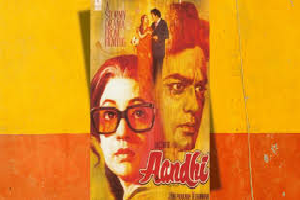9

It is impossible to imagine a society, country or nation without politics, which is a theme constantly under scrutiny, and I can’t ignore that national media driven by vested interests often does give prominence to the powerful controlling levers of powers.
I decided to pick up the country’s oldest party, that primarily led country’s freedom struggle against the British colonial masters under the unique leadership of Mahatma Gandhi and laid the foundations of the new nation in the framework of ‘Idea of India’ which had been institutionalised in the Constitution, is taking many initiatives to rebuild the organisation by attracting talent from large pool of professionals spread across various sectors because it is being either consciously being overlooked or deliberately ignored under pressure.
Before I dwell at length on the initiative, giving details and explaining its significance, the party’s All India Congress Committee session is being held in Ahmedabad this week on April 8-9 under the leadership of party’s President Mallikarjun Kharge veteran of many a battle having risen from the grassroots. The choice of Gujarat is clear evidence of the party’s determination to take the battle to the RSS-BJP stronghold where the saffron party has been in power since 1995.
The Indian National Congress was established on December 28, 1885. It first met in Gujarat at Ahmedabad during December 23-26, 1902, under the presidentship of Surendra Nath Bannerjee. The second time the INC met in Gujarat was at Surat during December 26-27, 1907, under the presidentship of Rash Behary Ghose. The third time the INC met in Gujarat was again in Ahmedabad during December 27-28, 1921, under the presidentship of Hakim Ajmal Khan.
The INC met in Gujarat for a fourth time at Haripura during Feb 19-21, 1938, under the presidentship of Netaji Subhas Chandra Bose. The INC met in Gujarat for the fifth time at Bhavnagar during Jan 6-7, 1961, under the presidentship of Neelam Sanjeeva Reddy.
Five sessions in total since 1902 and the one now after a gap of 64 years have been eventful, with one being suspended over pandemonium, one saw the emergence of Mahatma Gandhi as sole leader, one rejected British plans to give states powers to be independent.
Meeting in Gujarat for the sixth time in Ahmedabad, an extended CWC will be held at the Sardar Patel Memorial on April 8, and the AICC will meet the next day on the banks of the River Sabarmati between Sabarmati Ashram and Kochrab Ashram.
The meeting, set against the scenic backdrop of the Sabarmati Riverfront, will witness the presence of several Congress leaders, including party president Mallikarjun Kharge, senior leaders Sonia Gandhi, Rahul Gandhi, Priyanka Gandhi, and KC Venugopal.
Earlier, while preparing the party for the big event, the party’s top leadership met its district presidents in Delhi on March 27, 28 and April 3 and deliberated on ways to empower the district committees to take on the BJP at the ground level.
Now reverting to a major initiative that the Congress has taken, I must stress that this would a long way to strengthen the organisation in a major way. In recognition of the role of knowledge in politics, the Congress announced on April 4 a mid-career fellowship programme named after late Prime Minister Dr Manmohan Singh.
Under the Dr Manmohan Singh Fellows Programme, 50 mid-career professionals will be selected each year to contribute to society through politics.
“Through this initiative, we aim to bring a fresh approach to politics and foster mutual learning. This platform is for professionals who believe in the Constitution of India and the party’s core values. They will have an opportunity to bring their expertise into politics and contribute meaningfully”, the party informed the media.
“This is a serious programme for serious individuals with a strong commitment to public service. We hope that the future leadership of the Congress party will emerge from these cohorts of Dr Manmohan Singh fellows. That would be a fitting tribute to the legacy of the former prime minister of India,” another spokesperson told the media.
“Political leaders are not just meant to sit in the assembly or Parliament and pass Bills. They must possess in-depth knowledge of various domains to navigate complex issues. This initiative will go a long way in making the Indian National Congress stand out among other political parties,” said former IAS officer K Raju, who was a key member of the National Advisory Council during the UPA government and has now been appointed as one of the programme’s mentors.
Raju, who belongs to the SC community, has recently been appointed as the new Jharkhand in-charge of the Congress party, replacing Ghulam Ahmed Mir. His appointment is seen as part of the party’s broader strategy to integrate experienced professionals into leadership roles.
Manmohan Singh’s contributions to India are not hidden as they were monumental, particularly in shaping the country's economic trajectory. As Union Finance Minister in 1991, he played a pivotal role in liberalising India's economy, steering it away from a financial crisis and laying the foundation for sustained economic growth.
His tenure as prime minister from 2004-14 witnessed landmark initiatives such as the Mahatma Gandhi National Rural Employment Guarantee Act (MGNREGA), the Right to Information Act (RTI), and economic policies that strengthened India's global standing.
Within the Congress party, Dr Singh was known as a person of supreme integrity, intellect, and good governance. A trusted advisor to the party’s leadership, his policy-driven approach to governance set him apart as a leader committed to the idea of inclusive growth and social justice.
In my frank assessment, the party is moving forward in a right direction with a well- defined objective having identified the RSS as its main ideological opponent which is hell bent to negate all achievements since 1947 taking the country on a regressive path which cannot but only end in utter misery, chaos and ultimate destruction. Congress, hopefully once again, will save the country and its soul.





















































































































































































































































































































































































































































































































































































































































































































































































































































































































































































































































































































































































































































































































































































































































































































































































































































































